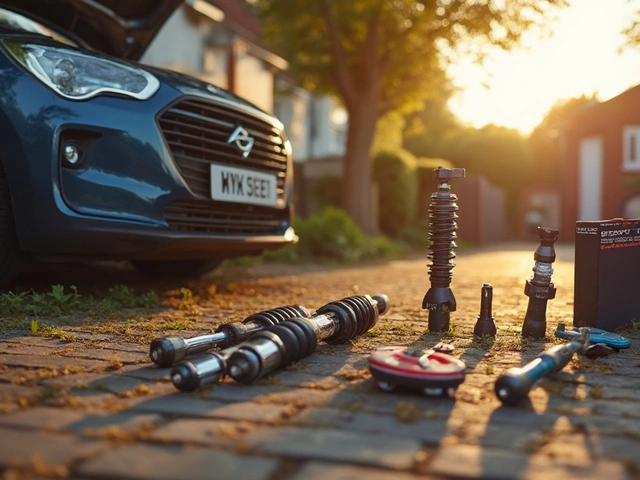Ever wondered what gives your car the vroom it needs to zip down the highway? The spark plug plays a big role here. This little gadget is key to starting your car. Its job sounds simple: ignite the air-fuel mixture in the engine cylinders. Without it, your car won't even start. Imagine trying to cook without a stove—pretty impossible, right?
So, how does it pump your car's heart? It creates a tiny electrical arc. This ignites the mixture, causing combustion that powers the pistons. It's like the mini firework show you never get to see! Now, if it wears out, your ride won't be as smooth as you like. So, let’s dig deeper into what keeps these spark plugs sparking and why you should care about them.
- Role in Engine Ignition
- How Spark Plugs Work
- Signs of a Failing Spark Plug
- Maintenance Tips
- Benefits of Quality Spark Plugs
Role in Engine Ignition
So, what exactly do spark plugs do in the grand scheme of getting your engine running? They play a critical role in your car's ignition system, working like the match that starts the whole fire.
How Spark Plugs Ignite the Engine
Simplifying things here, a spark plug does one main job: it creates a spark to light up the air-fuel mixture. This is a crucial step in the combustion process. Think of it like feeding your engine the fire it needs to get going.
The electrical energy from your car's ignition system is sent to the spark plug. Right at the tip of the plug, it creates a tiny spark, literally lighting the fire for the air-fuel mixture in the combustion chamber. This explosion pushes the pistons down. When repeated quickly, this process is what gives you the power to drive down the street.
What Happens If Spark Plugs Don't Work
Now, if your spark plug is tired or not working right, what's the consequence? Well, your engine might misfire, idle rough, or worse—it won't start at all. This just goes to show how this tiny component punches way above its weight in terms of importance.
Why Quality Matters
The quality of your spark plugs can impact fuel efficiency and engine performance. A well-functioning spark plug ensures clean and efficient combustion. With good quality plugs, you might find you're visiting the pump a bit less frequently, which is great for your wallet!
| Benefit | Impact |
|---|---|
| Improved Fuel Efficiency | Up to 30% less fuel consumption |
| Smoother Engine Performance | Reduces engine misfires |
In summary, never underestimate these little champs. Choosing and maintaining proper spark plugs is like giving your car a steady diet of high-quality fuel.
How Spark Plugs Work
Alright, so let's dive into the nitty-gritty of what a spark plug actually does. Picture your engine as a kind of orchestra, and the spark plug as the person who sets everything in motion. It's that literal spark of life for your car's engine.
A basic spark plug consists of a shell, an insulator, and an electrode. It sits snugly in the top of each cylinder in the engine, waiting for the exact moment to do its job. Its role? Creating a small electrical arc to ignite the compressed air-fuel mixture. This is what gets the pistons moving.
Breaking Down the Process
- Voltage: When you turn your ignition key, thousands of volts are sent through the spark plug. We're talking about 12,000 to even 45,000 volts, depending on your vehicle. That's where the action begins!
- Ignition: The electricity jumps across the small gap between the spark plug's central electrode and the side electrode. It's a tiny yet powerful arc of electricity that lights up the air-fuel mix inside the cylinder.
- Combustion: That spark initiates the combustion process, and boom—the small explosion pushes the piston down the cylinder, turning the crankshaft, which ultimately gets your wheels spinning.
The cycle repeats hundreds of times a minute, faster than you can blink. This constant sparking is essential for keeping your engine purring like a kitten.
Why Care? Efficiency & Performance
Think of the spark plug as the unsung hero of engine efficiency. They can control how smoothly your engine runs. Worn-out spark plugs often lead to misfires, affecting fuel economy and your car’s overall performance. That's why changing them every 20,000 to 40,000 miles can save you some headaches.
Not convinced yet? Check this out:
| Vehicle Type | Spark Plug Change Interval |
|---|---|
| Standard Car | 30,000 miles |
| High-Performance Vehicle | 20,000 miles |
| Long-Life Plugs | 100,000 miles |
Keeping your spark plug in tip-top shape means smoother rides and fewer trips to the mechanic. So, it's definitely worth paying attention to!

Signs of a Failing Spark Plug
When a spark plug starts to go bad, your car will throw hints like an old friend who needs help. The first clue? Trouble starting your engine. A worn-out spark plug can make it hard for your car to ignite the air-fuel mix, causing frustrating delays or even keeping the car from starting altogether.
Poor Fuel Economy
Watch out for a sudden drop in fuel efficiency. If your spark plug isn't doing its job, your car burns more fuel than it should. Imagine paying extra for gas and getting less mileage in return. It’s like pouring your money down the fuel tank!Engine Misfires and Rough Idling
Does your car sound like it’s trying to hum but fails miserably? Misfiring or a jerky idle are tell-tale signs of a failing spark plug. Imagine trying to listen to your favorite song, but the CD skips every few seconds—super annoying, right?Strange Noises
If your car starts talking back with knocking and pinging noises, it might be from a bad spark plug. This happens because unburned fuel leaves the cylinder, causing mini explosions. Keep your ears open for those telling sounds!Acceleration Trouble
Another red flag is sluggish acceleration. If your car doesn’t zip out quickly when you step on the gas, it might be time to check those spark plugs. It's the engine's way of saying, "I need a little help here!"If you start noticing any of these symptoms, taking a closer look at your spark plug could save you from bigger car headaches down the road. And yes, a trip to the mechanic might be in order to get those spark plugs swapped out before they cause more trouble than they're worth.
Maintenance Tips
Keeping your spark plugs in top shape doesn't require a mechanic's toolbox. Just a bit of know-how and regular attention can go a long way. Here are some tips to keep your car's heart ticking smoothly.
Regular Inspections
Check your spark plugs every 30,000 miles or as recommended by your car's manufacturer. A quick look can reveal a lot about their condition. If they look worn out or dirty, it’s time for a change.
Cleaning is Key
If the plugs are just a bit grubby with carbon build-up but otherwise intact, clean them gently. Use a wire brush or a specialized cleaner. This can boost your vehicle's performance without the need for immediate replacement.
Gap Matters
Spark plugs need the right gap—a tiny space at the tip, measured in millimeters. Too wide, and they might not spark; too narrow, and you might experience engine knocking. A simple tool called a spark plug gap gauge will help you adjust this.
Mind the Torque
Installing spark plugs isn’t just about screwing them in. They need to be tightened just right—not too loose, not too tight. This is where a torque wrench comes in handy, ensuring the plug is snug without risking damage.
Know When to Replace
Even with the best care, all things have their limits. Signs like misfiring, hard starts, or reduced fuel economy are hints that it might be time for new spark plugs. Keeping a schedule for replacement helps maintain engine ignition efficiency.
Quality Counts
Cheap plugs might save cash short-term, but investing in reputable brands can make a big difference in longevity and car maintenance costs. Look for recommendations from your vehicle's user manual or experienced mechanics.
Stay on top of these tips, and your car will reward you with better performance and fewer headaches. Keeping those spark plugs in shape isn’t just good for your car—it's good for your peace of mind, too!

Benefits of Quality Spark Plugs
Alright, let's get to the good stuff — the perks of investing in quality spark plugs for your ride. It might seem like a small thing, but a good spark plug can make a big difference. Here's why.
Better Fuel Efficiency
Who doesn't love saving a few bucks at the pump? High-quality spark plugs ignite the air-fuel mixture efficiently, leading to better combustion and less waste. This means your engine doesn't have to work as hard, and you get more miles for your gas. Just imagine driving that extra mile without coughing up more dough!
Smoother Engine Performance
Ever had a car that sputters like it's got a hiccup? That's often the sign of a tired spark plug. Good ones ensure smooth and consistent engine performance. Your car will start effortlessly, giving you a steady and quiet drive. It's all about making sure your engine isn't struggling to keep up.
Reduced Emissions
Going green might not be the first thing on your mind, but quality spark plugs can help with that. A proper burn means fewer unburnt fuel emissions leaving your tailpipe. So, you’re not just being kind to your wallet but also doing a little for the planet. It's a win-win you didn't expect!
Longevity of Engine Components
Keeping those engine parts running like a charm is crucial. Misfiring spark plugs can cause unnecessary strain on your engine, wearing down parts faster. High-quality plugs minimize this risk, helping extend the life of your engine. It’s like regular exercise for your car's heart — keep it fit!
Less Frequent Replacements
Quality parts, including those spark plugs, mean you won’t be shelling out for replacements as often. They're built to last longer, which means fewer trips to the mechanic and more savings in your pocket. Plus, it saves you from the hassle of unexpected breakdowns.
| Benefit | Impact |
|---|---|
| Fuel Efficiency | 5-10% better mileage |
| Engine Smoothness | Reduced misfiring and sputtering |
| Emission Reduction | Lower carbon footprint |
| Engine Longevity | Longer-lasting engine components |
In a nutshell, while it might seem like a minor part, opting for great engine components like spark plugs pays off in more ways than one. From cost savings to better performance, it’s clear why quality matters.






